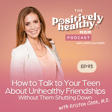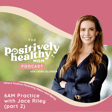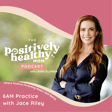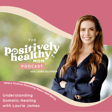
Anxiety Calming Music | The Positively Healthy Mom Podcast with Barbara Minton
🎧 The Positively Healthy Mom Podcast
Episode: Anxiety Calming Music with Barbara Minton, PhD
In this episode, host Laura Ollinger, Teen and Parent Well-Being Coach, talks with Dr. Barbara Minton, PhD Psychologist and founder of musicandhealing.net, about how music can calm anxiety, improve focus, and support emotional wellness.
Dr. Minton shares how her neuroscience-based approach uses specific music frequencies to shift the brain into states of calm and healing. Her new album Calm the Storm, created with world-renowned guitarist Peppino D’Agostino, is designed to reduce anxiety, support sleep, and ease chronic pain.
💡 In this episode, you’ll discover:
- How music influences brain waves and emotional regulation
- Why not all calming music works the same for everyone
- The connection between rhythm, movement, and stress relief
- How neurofeedback and music can train the brain toward calm
🎶 Visit musicandhealing.net to learn more and listen to Calm the Storm.
🔗 Connect with us:
Website: positivelyhealthycoaching.com
Podcast: positivelyhealthycoaching.com/podcast
YouTube: @positivelyhealthycoaching
Facebook Group: The Positively Healthy Mom
Instagram: @positivelyhealthycoaching
#PositivelyHealthyMom #AnxietyCalmingMusic #BarbaraMinton #MusicTherapy #BrainHealth #Neurofeedback #ParentWellbeing #PositiveParenting #MusicAndHealing #MentalHealth



















